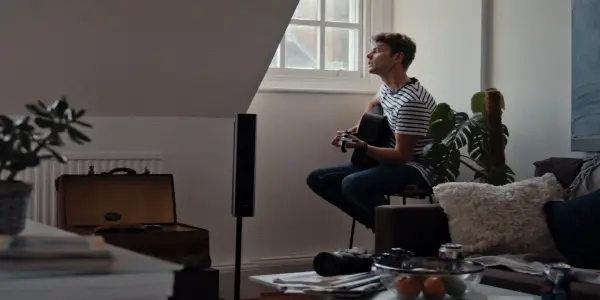Writer and director Nick Rizzini has created a compelling and timely drama titled Framed. The film stars Thomas Law and Lottie Amor. Framed takes place in the U.K and is about a photographer guilty of voyeurism and all that comes along with that in the modern age.
Setting the Tone
There are several films with a peeping Tom storyline, most notably Alfred Hitchc*ck’s Rear Window, which seems to set the benchmark for such a film. However, Rizzini has a style all his own, which sets his film apart from others within the peeping Tom category. Instead of an element of horror, Framed is a bit more casually realistic in tone with relatable characters from everyday life that the average person can understand.
Karl (Thomas Law), is a young artist who quit his corporate job in pursuit of his passion for photography. When he spies a neighbor, portrayed by Sarah Barlondo, across the way through a window in her undergarments, he starts snapping away on his camera. When he confesses to his best friend, Virginia (Lottie Amor), about what he’s been up to, she serves as a moral sounding board and rails into him. The conversations get quite heated regarding voyeurism and privacy vs artistic nature. Karl’s actions have an air of innocence that accompanies them.

The dialog is realistic offering different opinions and perspectives on what is right or wrong; a conversation one can actually imagine someone having with their friend who confesses to committing such an act upon an unsuspecting person of interest. Good points are raised on both ends and it leaves the viewer thinking about the moral vs immoral implications of his action. Is it art or invasion of privacy? Can it be both? Karl boasts to Virginia that these images are for his upcoming art exhibit, stating that privacy is the theme he’s going for but she doesn’t appear to be buying what he’s trying to sell her on that front. She queries why he’s so keen on doing an exhibition so early in his career and likens his actions to that of a stalker. I particularly enjoyed the bits of the conversation about women being sexualized all the time.
Social Awareness
Karl is soon caught by his subject and startled by it at first. The woman being photographed wants to see the photos. Soon she’s posing for him willingly which implies consent. Soon after the woman in the window sends a note under Karl’s door about taking more photos at a specific time in the evening. Karl’s obsession grows and then a detective shows up at his door bringing a new layer of consequences to his shutterbug antics. However, the woman in the window has vanished, moving out of her flat with seemingly no trace.
Socially the film raises questions; is it moral or immoral to photograph someone without their knowledge and or consent? Until recent years many photographers made a living by doing just that; photographing the homeless sleeping on park benches and making exhibits out of it or of young children crying, laughing, or playing; candid shots of people living a life made for great art once upon a time. Consent in photography hasn’t always been a thing but at some point it became a violation of privacy to shoot images of someone without their knowledge and consent, now needing a signed release form to take images of another person, especially if they are to be used on display.
It’s a bit controversial, raising questions about how we would feel being photographed without our knowledge while we’re in the privacy of our own homes, even if the curtains are open. Do open curtains mean we want to be watched? Can we feel safe in our homes never knowing who might be watching across the way? On the other hand, as an artist or photographer, do we have the right to make anyone our subject or muse at will? Even without their consent? Is it flattery or is it akin to being a stalker?
In Conclusion
As a filmmaker, Rizzini makes great use of few settings and a small cast. His writing is strong as are his actors. Thomas Law and Lottie Amor are both terrific in their roles. They have dimension and believability, with acting talent that is captivating to the viewer. They have great onscreen chemistry together that works well with the plot of the film the whole way through. Law’s character comes more from an ego-driven place of doing what he wants because he wants to do it and looking for justification for his actions. Whereas Amor’s character provides the argument of moral justice and why what he’s doing might not be fair or right. The back and forth between them provides a good balance of the male vs female perspectives.
Framed was well done in all technical aspects, especially for a low-budget independent film. The cinematography by Matteo Rea was beautifully shot. The picture is polished and professional. Framed was complemented with an original soundscape by Umberto Smerilli that fit the film perfectly. Rizzini has created an intriguing film with a satisfying ending for the audience.
Framed has just the right amount of suspense, drama, and romance to make it work, with a wonderfully written dialog which flows naturally from the cast. It’s enjoyable to watch a film that isn’t wrought with cancel culture idealism but instead brings perspective and genuine curiosity about human nature, privacy, voyeurism, obsession, friendship, and relationships.
How would you feel being photographed without your knowledge? Let us know in the comments below!
Framed is now available on Amazon Prime!
Watch Framed
Does content like this matter to you?
Become a Member and support film journalism. Unlock access to all of Film Inquiry`s great articles. Join a community of like-minded readers who are passionate about cinema - get access to our private members Network, give back to independent filmmakers, and more.